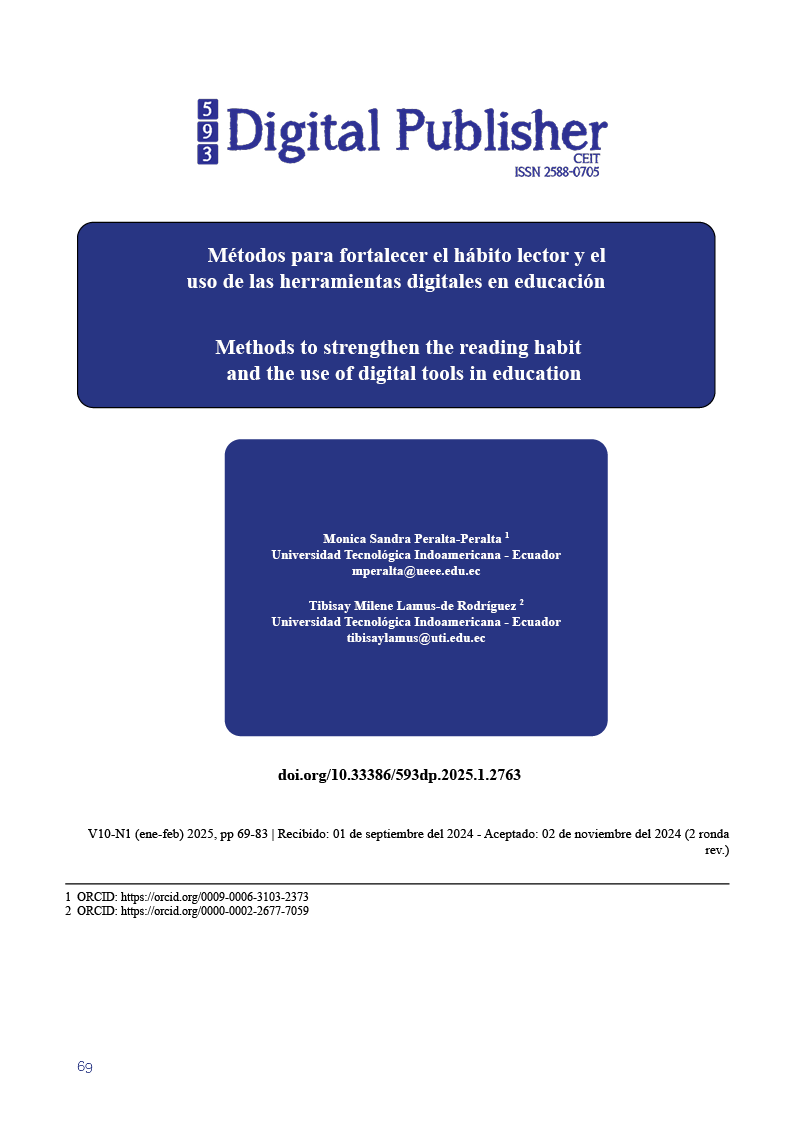Methods to strengthen the reading habit and the use of digital tools in education
Main Article Content
Abstract
The objective of this article is to analyze the methods that teachers use to strengthen the reading habit and the use of digital tools in basic secondary education of the Esperanza Eterna Educational Unit, Province of Pastaza, Puyo parish, La Primavera sector, during the year 2023-2024 school year. Methodologically, it is conducted through quantitative research, using the inductive-deductive method, with which the data were collected through the survey technique, having as an instrument of inquiry a Likert-type questionnaire applied to the teachers of the aforementioned institution. The results showed that the majority of teachers do carry out practices to promote the reading habit and even they themselves have that habit, which is positive to multiply the culture of reading frequently. Additionally, teachers frequently use the virtual classroom, supported by two digital applications such as Canva and Prezzi, since there is a wide range of software to incorporate into reading promotion activities. (in this way it indicates the use of these two programs when there is a wide range to motivate children to read and use digital tools. Among the conclusions, we have that the teaching and learning process is optimized every day in depth and form, all with the aim of reaching the student body in a better way, since the use of technological tools facilitates the interaction between the teacher and the student, achieving better interaction.
Downloads
Article Details

This work is licensed under a Creative Commons Attribution-NonCommercial-ShareAlike 4.0 International License.
1. Derechos de autor
Las obras que se publican en 593 Digital Publisher CEIT están sujetas a los siguientes términos:
1.1. 593 Digital Publisher CEIT, conserva los derechos patrimoniales (copyright) de las obras publicadas, favorece y permite la reutilización de las mismas bajo la licencia Licencia Creative Commons 4.0 de Reconocimiento-NoComercial-CompartirIgual 4.0, por lo cual se pueden copiar, usar, difundir, transmitir y exponer públicamente, siempre que:
1.1.a. Se cite la autoría y fuente original de su publicación (revista, editorial, URL).
1.1.b. No se usen para fines comerciales u onerosos.
1.1.c. Se mencione la existencia y especificaciones de esta licencia de uso.
References
Alcivar, C., Vargas, V., Calderon, J., Triviño, C., Santillan, S., Soria, R., & Cardenas, L. (2019). El uso de las TIC en el proceso de enseñanza- aprendizaje de los docentes en las Universidades del Ecuador. Revista Espacios ISSN 07981015, 27. https://reunir.unir.net/handle/123456789/8062
Amiama-Espaillat, C., & Pacheco-Salazar, B. (2022). Perfil lector de docentes de los primeros grados y sus conocimientos sobre la enseñanza de lectoescritura inicial. Revista Educación, 46(2), 67-83. http://dx.doi.org/10.15517/revedu.v46i2.47918
Babativa Novoa, C. A. (2017). Investigación cuantitativa. https://digitk.areandina.edu.co/entities/publication/45461a56-9c00-47c4-9405-cfa73dae0449
Barcia-Zambrano, A. S., & Mendoza-Vergara, G. M. (2020). Prezi como herramienta innovadora para mejorar el proceso de enseñanza- aprendizaje en los estudiantes. Dominio De Las Ciencias, 6(5), 429–444. https://doi.org/10.23857/dc.v6i5.1611
Bermúdez Sarguera, R., Casanova Montero, A. R., & Pentón Quinter, A. (2024). El método inductivo-deductivo es solo una entelequia filosófica . Revista Cubana De Educación Superior, 43(2 may-ago), 261–279. Recuperado a partir de https://revistas.uh.cu/rces/article/view/9507
Castanedo Alonso, J. M. (2021). Aplicación del aprendizaje dialógico en el área de Educación Física: Modelo inclusivo "Retos interactivos con Responsabilidad Compartida". Barcelona: Tesis Doctoral. https://diposit.ub.edu/dspace/handle/2445/177026
Castillo Lopez, D. (2020). Las TIC en los procesos de enseñanza-aprendizaje desarrollados por maestros tutores de Educación Primaria en la Región de Murcia. Revista Interuniversitaria de Investigación en Tecnología Educativa. ISSN: 2529-9638 DOI: https://doi.org/10.6018/riite.432061, 1-14.
García Guerrero, J.(2017)“Historia del método científico”. https://es.scribd.com/document/3319763/Historia-del-metodo-cientifico
Hismeri., Sanzan, G. C., Molina, C. A., Briceño, M. O., & Juan, J. E. S. (2020). Experiencias y saberes pedagógicos de docentes en el comienzo del oficio educativo: una indagación narrativa. Revista Brasileira de Educação, 25, e250053. http://doi.org/10.1590/S1413-24782020250053
Lagua Chimborazo, M. M. (2023). Estrategia sustentada en el trabajo colaborativo para el desarrollo de la expresión escrita en estudiantes de séptimo año. Ambato-Ecuador. https://rraae.cedia.edu.ec/Record/UTI_60768789ecfd3234a7ba4f3aed5dcf5a
Llangari Morillo , A. A. (2023). Conciencia lingüistica para el desarrollo de la lecto escritura que se identifican en las niñas y niños de inicial a 7mo año de Educación General Básica. . Quito-Ecuador : Tesis para la obtencion del titulo de maestria en educación. https://repositorio.uti.edu.ec/handle/123456789/5631
Martínez-García, G. (2020). Recursos y herramientas comunicacionales ante los retos de la educación virtual. Correspondencias & análisis, (12), 11. https://dialnet.unirioja.es/servlet/articulo?codigo=7661100
Munita, F. (2017). El sujeto lector didáctico: “lectores que enseñan y profesores que leen”. Alabe Revista De Investigación Sobre Lectura Y Escritura, (17). https://doi.org/10.15645/Alabe2018.17.2
Muñoz, C., Munita, F., Valenzuela, J., & Riquelme, E. (2018). Profesores que leen y enseñan a leer: El lugar de la lectura durante la formación. Revista espacios, 39(40). http://w.revistaespacios.com/a18v39n40/18394032.html
Muñoz, C., Munita, F., Valenzuela, J., & Riquelme, E. (2018). Profesores que leen y enseñan a leer: El lugar de la lectura durante la formación. Revista espacios, 39(40). https://www.revistaespacios.com/a18v39n40/a18v39n40p32.pdf
Muso Avilés, K. F. (2017). Déficit de la lectura en proceso formativo de educación básica media (Bachelor's thesis, Latacunga: Universidad Técnica de Cotopaxi; Facultad de Ciencias Humanas y Educación; Licenciatura en Educación Básica). http://repositorio.utc.edu.ec/handle/27000/4321
Muso Avilés, K. F. (2017). Déficit de la lectura en proceso formativo de educación básica media (Bachelor's thesis, Latacunga: Universidad Técnica de Cotopaxi; Facultad de Ciencias Humanas y Educación; Licenciatura en Educación Básica). https://repositorio.utc.edu.ec/handle/27000/4321
Pacheco-Salazar, B., & Amiama-Espaillat, C. (2023). ¿ Qué leen los docentes? Análisis de los libros que los docentes dominicanos declaran haber leído. RECIE. Revista Caribeña de Investigación Educativa, 7(2), 199-214. https://revistas.isfodosu.edu.do/index.php/recie/article/view/601
Páez Espitia, L. E., & Mercado Castro, E. C. (2021). Fortalecimiento de la lectura comprensiva mediante el recurso educativo digital Educaplay en segundo grado de la Institución Educativa Distrital Camilo Torres de Barranquilla (Doctoral dissertation, Universidad de Cartagena). https://repositorio.unicartagena.edu.co/handle/11227/12010
Páez Espitia, L. E., & Mercado Castro, E. C. (2021). Fortalecimiento de la lectura comprensiva mediante el recurso educativo digital Educaplay en segundo grado de la Institución Educativa Distrital Camilo Torres de Barranquilla (Doctoral dissertation, Universidad de Cartagena). https://repositorio.unicartagena.edu.co/handle/11227/12010
Ríos González , G., & González Cárdenas , Y. (2020). “Estimular el uso del blog en los hábitos de lectura, en los estudiantes de educación básica primaria de la institución educativa Maria Auxiliadora, 2019. Lima, Perú: Tesis de estudio para obtener el titulo de Maestro. https://repositorio.uwiener.edu.pe/bitstream/handle/20.500.13053/4649/T061_AP088771_M.pdf?sequence=1
Rodriguez Gomez, E., Villamil Sarmiento , M. J., & Rodriguez Castellanos , R. E. (2022). El blog digital como estretegia didactica para el fortalecimiento de la comprension lectora en los estudiantes del grado segundo de la IED Colegio Paulo VI. . Cartagena de Indias - Colombia : Tesis de estudios universitarios de maestria . https://repositorio.unicartagena.edu.co/handle/11227/16417
Sailema Tiban , C. d. (2023). Estrategia didáctica basada en el aprendizaje por descubrimiento para el fortalecimiento del pensamiento critico en estudiantes de Bachillerato Tecnico. Ambato: Tesis de Maestria. https://repositorio.uti.edu.ec/handle/123456789/5319
United Nations Educational, Scientific and Cultural Organization (UNESCO, 2015) UNESCO ICT Competency Framework for Teachers; 2018; ISBN 978-92-3-100285-4. https://unesdoc.unesco.org/ark:/48223/pf0000265721
Vega Vergara, S. C. (2021). Rincón de lectura y su impacto en el desarrollo de lenguaje de los niños del subnivel 1 de la unidad educativa “Sebastián de Benalcazar”. Babahoyo: Tesis de grado para la obtención del título de licenciado en ciencias de la educación. http://190.15.129.146/bitstream/handle/49000/10885/P-UTB-FCJSE-EINIC-000016.pdf?sequence=1&isAllowed=y



